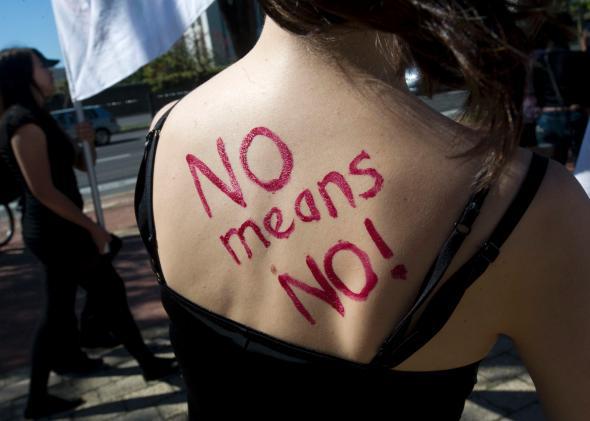James Taranto, notorious anti-feminist troll, recently published a column in the Wall Street Journal rehashing the unevidenced claim that most rape cases are a matter of drunk women regretting their sexual choices. (In the mythology of misogynists, women often prefer to spend months and years reliving a bad night of sex, especially if they can involve juries and the police.) I blew the piece off when it first came out, since Taranto’s schtick of painting women as so irrational and hateful that they don’t even seem human gets old fast. But unfortunately the conservative media is transfixed and thinks Taranto really has an excellent gotcha with the claim that “when two drunken college students ‘collide,’ the male one is almost always presumed to be at fault.”
Scott Greenfield at the blog Simple Justice thinks Taranto has a compelling argument. He argues, without a single supporting quote from a feminist, that feminists believe “consensual sex can occur, but is subject to post-coital regret. If the woman decides afterward that it wasn’t a great idea, then what would have appeared to be consensual sex at the time becomes rape after the fact.” (He also suggests that many feminists believe all sex is rape, thus demonstrating a distinct lack of any real understanding of feminism at all.)
Greenfield doesn’t bother to offer any examples of consensual, if drunken, sex that resulted in imprisonment or other penalties for the guy. His evidence is mainly a quote from the blog FIRE that uses a truncated quote from the Stanford policy on sexual assault: “Stanford policy states that sexual assault occurs ‘when a person is incapable of giving consent. A person is legally incapable of giving consent … if intoxicated by drugs and/or alcohol.’ In other words, any sexual activity while intoxicated to any degree constitutes sexual assault.” But is that really true? Reading the policy in full makes it clear that the policy is more comprehensive: Intoxication is just one of the many factors taken into consideration when evaluating a victim’s claim of nonconsent:
Sexual assault is the commission of an unwanted sexual act, whether by an acquaintance or by a stranger, that occurs without indication of consent of both individuals, or that occurs under threat or coercion. Sexual assault can occur either forcibly and/or against a person’s will, or when a person is incapable of giving consent. A person is legally incapable of giving consent if under age 18 years; if intoxicated by drugs and/or alcohol; if developmentally disabled; or if temporarily or permanently mentally or physically unable to do so.
Considering that the policy explicitly states that the sex in question is unwanted, the paranoia that wanted sex is going to be redefined as rape after the fact because a woman drank alcohol seems unjustified. (After all, the accused can argue the sex was wanted and can bring evidence to support that contention.) Indeed, one reason this paranoia is so infuriating is that rapists tend to target drunk women specifically because they know that people who are too drunk to remember what’s going on make really bad witnesses in court. We don’t have an epidemic of women exploiting men’s drunkenness to get them thrown into jail, but we do have an epidemic of rapists exploiting women’s drunkenness to get away with their crimes.
This is all why it’s doubly important, then, to support the push for states and universities and other institutions to create an affirmative consent standard, where both parties should display a “demonstrated intent to have sex” in order for it to be considered consent. Looking for a woman who said “yes” (or any variation of it, which can be expressed in a variety of ways, both verbal and nonverbal) instead of focusing on whether she said no in exactly the right words will help put the role alcohol plays into focus. It will clear up some of the murky gray areas, such as cases where a woman is too drunk to be articulate in her refusals but not so drunk that she passes out. It will also offer a degree of protection for scared men, because a somewhat intoxicated woman who explicitly asks for sex will have a hard time convincing the courts she hasn’t “demonstrated intent” to bone. It’s an easy way to get more guilty men convicted while offering protection for innocent men.
